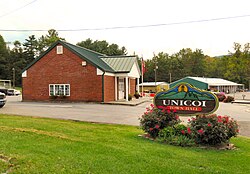Unicoi, Tennessee
| Unicoi, Tennessee | |
|---|---|
| Town | |

Unicoi Town Hall
|
|
 Location of Unicoi, Tennessee |
|
| Coordinates: 36°13′12″N 82°20′17″W / 36.22000°N 82.33806°WCoordinates: 36°13′12″N 82°20′17″W / 36.22000°N 82.33806°W | |
| Country | United States |
| State | Tennessee |
| County | Unicoi |
| Incorporated | 1994 |
| Named for | Unaka, Cherokee for "white" |
| Area | |
| • Total | 16.3 sq mi (42.1 km2) |
| • Land | 16.3 sq mi (42.1 km2) |
| • Water | 0.0 sq mi (0.0 km2) |
| Elevation | 1,923 ft (586 m) |
| Population (2010) | |
| • Total | 3,632 |
| • Density | 216.4/sq mi (83.5/km2) |
| Time zone | Eastern (EST) (UTC-5) |
| • Summer (DST) | EDT (UTC-4) |
| ZIP code | 37692 |
| Area code(s) | 423 |
| FIPS code | 47-75820 |
| GNIS feature ID | 1304219 |
| Website | www |
Unicoi is a town in Unicoi County, Tennessee, United States. The population was 3,519 at the 2000 census and 3,632 at the 2010 census. It is part of the Johnson City Metropolitan Statistical Area, which is a component of the Johnson City–Kingsport–Bristol, TN-VA Combined Statistical Area – commonly known as the "Tri-Cities" region.
Unicoi was originally known as "Greasy Cove." In 1851, the Swingle brothers opened a post office in the community, and named it "Swingleville." In 1876, Dr. F.H. Hannum obtained control of the post office, and changed its name to "Limonite." When the railroads arrived in the valley in the late 1880s, the name was changed to "Unicoi City," and later shortened to its current form. The town developed in the early 20th century as a shipping point for area mining and logging operations.
Unicoi is located at 36°13′12″N 82°20′17″W / 36.22000°N 82.33806°W (36.220028, -82.338138). The town is situated in the North Indian Creek Valley (known locally as "The Valley Beautiful"), at a point where North Indian Creek emerges from the mountains to the southeast and bends to the southwest toward Erwin and its eventual confluence with the Nolichucky River. The northern portions of Unicoi are located in the headwaters of Buffalo Creek, which flows northeastward (in the opposite direction from North Indian Creek) and eventually empties into the Watauga River.
...
Wikipedia
